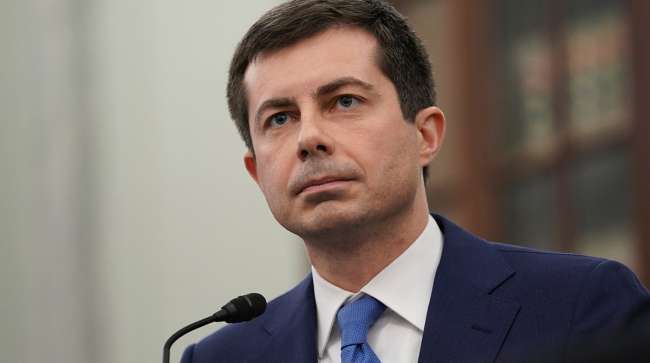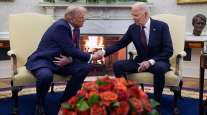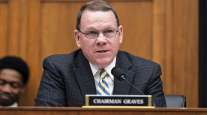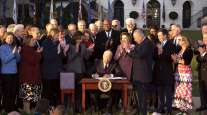Senior Reporter
Secretary Buttigieg Promotes Transformative Infrastructure Plan

[Stay on top of transportation news: Get TTNews in your inbox.]
The Biden administration is ready to engage with Congress to improve the flow of freight and commuters by modernizing the country’s mobility networks, the nation’s top transportation official told a U.S. House panel March 25.
Less than a week before President Joe Biden is set to reveal details about his multitrillion-dollar infrastructure policy agenda, Transportation Secretary Pete Buttigieg called on lawmakers to craft a transformative infrastructure policy landscape for the country.
“Now is the time to clear the backlog and repair our highways, roads, bridges, maritime ports and airports, to enhance freight and passenger rail, and to provide accessible public transit and mobility options for all,” the secretary told members of the Transportation and Infrastructure panel.
Through significant investments in freight corridors, transit systems and vehicular technologies, the nationwide transportation grid would be better equipped to respond to climate change, said the secretary.
“Every dollar we spend rebuilding from a climate-driven disaster is a dollar we could have spent building a more competitive, modern and resilient transportation system that produces significantly lower emissions,” he said.
Buttigieg also said that the present moment is a once-in-a-century chance to update people’s concept of transportation via autonomous vehicles, expanded access to public transit, and walkability options. He pointed to the need to repair legacy projects and systems, which have been vital to supply chain operations.
“Now is the time to improve the air we breathe and tackle the climate crisis by moving the U.S. to net-zero greenhouse gas emissions, building a national [electric vehicles] charging network, and investing in transit, transit-oriented development, sustainable aviation and resilient infrastructure,” the secretary added. Details regarding the funding mechanism for a comprehensive, multiyear transportation measure have yet to be revealed.
The hearing served to preview parts of Biden’s infrastructure plan. Biden is scheduled to travel to Pittsburgh on March 31 to outline his so-called “Build Back Better” economic vision. White House officials explained the plan will consist of infrastructure-centric funding proposals aimed at remaking transportation corridors, enhancing access to broadband, and pursuing renewable energy and electrification initiatives.
During the most recent presidential campaign, both Biden and Buttigieg proposed investing in infrastructure projects, as well as tackling climate change concerns.
Rep. Peter DeFazio (D-Ore.), the committee chairman, told Buttigieg he endorses nearly every mobility proposal from the Biden team. DeFazio has signaled the potential for the House transportation committee to consider a multiyear highway policy bill sometime in May.
The measure, meant to update a 2015 national highway law, would be an aspect of Democrats’ overall infrastructure agenda.
DeFazio said, “The American people, who rely on our roads, bridges, bike lanes, transit systems, railroads, airports and waterways for their mobility and for their livelihoods, cannot wait. Infrastructure is integral to the functioning of our economy and investing heavily in it at this moment in time is key to our nation’s recovery.”
Chair @RepPeterDeFazio's vision for rebuilding America's infrastructure:
-Fixing our roads & bridges
-Improving transit to cut congestion/ emissions
-Creating smarter, safer roads
-Modernizing airports
-Updating wastewater infrastructure
-Better maintaining ports
+Much more! pic.twitter.com/R2J6BDRgFm — Committee on Transportation and Infrastructure (@TransportDems) January 16, 2021
The committee chairman also pointed to colleagues, both Democrats and Republicans, for assistance in crafting the highway legislation via a “transparent, equitable process.” The panel intends to pursue earmarking during the bill’s consideration. Earmarks, which were banned for a decade due to controversy, consist of directing federal spending for specific projects.
Meanwhile, Rep. Sam Graves (R-Mo.), the committee’s ranking member, urged Democrats to consider input from Republicans during a highway bill’s consideration. Specifically, Graves suggested policymakers prioritize highway-centric provisions during the upcoming legislative hearing, which is known as a markup.
“While infrastructure means different things to different people, to me and my colleagues on the transportation committee, it’s the highway bill. And a bipartisan highway bill that improves our infrastructure, creates jobs and strengthens the U.S. economy should be a top priority for this committee,” Graves said. “Partnership, not partisanship, gets results.”
He further emphasized, “This bill cannot grow into a multitrillion-dollar catchall. It needs to be manageable and responsible.”
Graves has touted a funding strategy that relies on issuing a fee to motorists for the miles they travel, or a vehicle-miles-traveled fee. It is unclear which funding program transportation policymakers plan to adopt.
Congress has not ensured the long-term solvency of the federal Highway Trust Fund account. State agencies receive assistance from revenue generated by the trust fund. However, depleting revenue from the 24.4 cents-per-gallon diesel tax and 18.4 cents-per-gallon gas tax has proven to be insufficient to meet the fund’s obligations. The fuel rate was set in 1993.
Want more news? Listen to today's daily briefing below or go here for more info:




